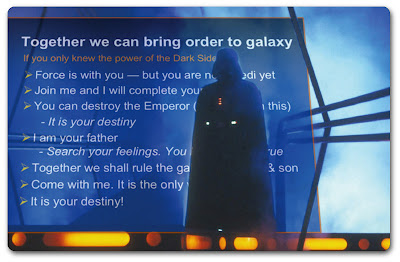 A few years back, my church very kindly presented to me a personal copy of the 1662 Book of Common Prayer (BCP) on my ordination to the Presbyterate (Priesthood) . I have other copies of the BCP, but the print is so tiny that my eyes hurt to read it. But I now have a readable copy.
A few years back, my church very kindly presented to me a personal copy of the 1662 Book of Common Prayer (BCP) on my ordination to the Presbyterate (Priesthood) . I have other copies of the BCP, but the print is so tiny that my eyes hurt to read it. But I now have a readable copy.So, anyways, I thought I'd write a series of posts sharing my thoughts on the 1662 BCP as I read though it. I have no other agenda here except to point out things of interest to me.
The catalyst for my interest in common prayer is the Hoo Haa of the Anglican Church . I ought to say that I have previously written about my 'journey' with liturgy HERE. So you can click on that and read if you want to.
Here is my first observation on the 1662: The writers of the Preface, in speaking about some alterations from previous books, wrote this-
For we are fully persuaded in our judgements (and we here profess it to the world) that the Book, as it stood before established by Law, doth not contain in it any thing contrary to the Word of God, or to sound Doctrine, or which a godly man may not with a good Conscience use and submit unto, or which is not fairly defensible against any that shall oppose the same; if it shall be allowed such just and favourable construction as in common equity ought to be allowed to all human Writings, especially such as are set forth by Authority, and even to the very best translations of the holy Scripture itself.I didn't do a lot of thinking about what it means to be 'Anglican' in previous parishes. There are cultural, historical, geographic and personal reasons why that was the case. In every good way, I thought of myself only as a Christian; as an adopted child of God. If anything else, perhaps I thought of myself as a reformed evangelical. But I did not think a whole lot about being Anglican.
But here in America, the Christian world is so very denominationalized. You cannot really get by without taking in account heritage, and why a person chose the church they did. Young and old alike, people ask me about being Anglican. All of which I found quite puzzling.
One question I am regularly asked is:
- What is the 'Anglican position' on 'X'?
The question itself, without a concrete answer has caused some here in the U.S. to consider Roman Catholicism. I have written HERE about that. The appeal for them is that there appears to be an actual answer to the question. What does it mean to be Roman Catholic? Discover the Magisterium of the Church. (Says the Catechism: "The task of interpreting the Word of God authentically has been entrusted solely to the Magisterium of the Church, that is, to the Pope and to the bishops in communion with him.").
I can't tell you how much this bothers me. Here is the rub for me: What happens if, while searching and then even finding an answer in the Magisterium of Rome, you discover a deeply flawed position or teaching? What if the desire to have an answer ends up overriding the answer itself? Put simply: I may desperately want an answer to the question. I may want it so much that I am willing to accept all sorts of crazy and weird revisions. For example, the Immaculate Conception of Mary? Hello?
So, what is the 'Anglican position' on 'X'?
The simplest answer is this: "The 'Anglican Position' on 'X' is the Christian position on 'X'. I do not mean to be arrogant or obscurantist. I mean to say that when someone says: What's the Anglican Position? I say -- Well, what does the Bible say? What does Jesus command? What do the prophets and the apostles say? If we can, together with all the saints both now and throughout history, submit to the Bible's teaching, then we have ourselves an 'Anglican position'.
I believe that Alister McGrath calls it "Christianity's dangerous idea."
I know that leaves many questions open. But Article 6 of the 39 Articles, simply says this:
Holy Scripture containeth all things necessary to salvation: so that whatsoever is not read therein, nor may be proved thereby, is not to be required of any man, that it should be believed as an article of the Faith, or be thought requisite or necessary to salvation.In other words, Anglicans are a Bible people (or at least they are meant to be.) So I'm thinking that if you are an Anglican, go and read your Bible.
Really.
Now.
Go.
Go and 'read, mark, learn, and inwardly digest' it.
And then begin a lifelong journey in learning with others. Marking and digesting the work of trustworthy men and women throughout history who have also submitted themselves to 'read, mark, learn, and inwardly digest' the Bible.
But before you go, make sure you pray the Prayer for the Second Sunday in Advent:
BLESSED Lord, who hast caused all holy Scriptures to be written for our learning; Grant that we may in such wise hear them, read, mark, learn, and inwardly digest them, that by patience and comfort of thy holy Word, we may embrace, and ever hold fast, the blessed hope of everlasting life, which thou hast given us in our Saviour Jesus Christ. Amen.See if you find an Anglican position. (It's the Christian one).
Discuss.
________________________
Further Reading: Dr Paul Barnett's Ten Elements of Historic Anglicanism.
























